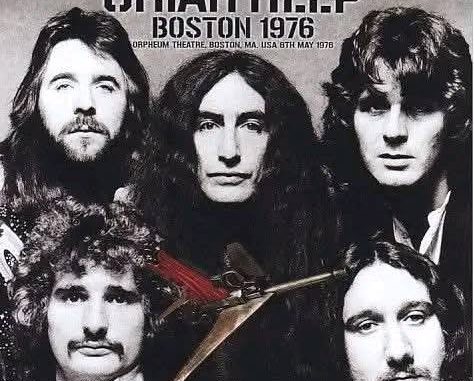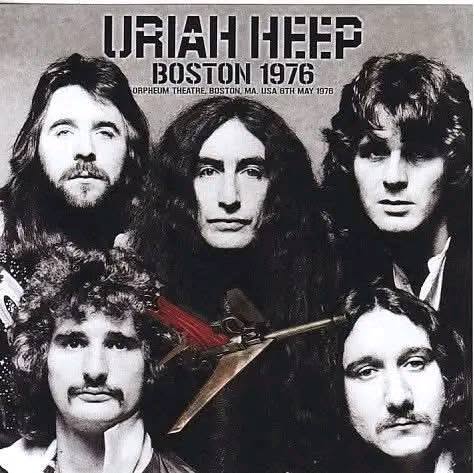
Few bands in rock history have embodied the spirit of hard rock and early heavy metal quite like Uriah Heep. With soaring vocals, Hammond organ wizardry, and harmonized guitars, the British group helped define a sound that bridged the gap between progressive rock and heavy metal in the 1970s. Though often underrated compared to contemporaries like Deep Purple, Led Zeppelin, and Black Sabbath, Uriah Heep’s legacy runs deep, influencing generations of musicians and maintaining a devoted global fanbase more than five decades after their debut.

The Early Years (1969–1971): From Spice To Heep
Uriah Heep’s story begins in London, 1969, when guitarist Mick Box and vocalist David Byron transformed their previous band, Spice, into something grander and more ambitious. With the addition of keyboardist Ken Hensley, bassist Paul Newton, and drummer Alex Napier, the group adopted a new name inspired by the scheming character from Charles Dickens’ David Copperfield, Uriah Heep.
Their debut album, …Very ‘Eavy …Very ‘Umble (1970), introduced a unique fusion of heavy guitar riffs, rich harmonies, and organ-driven arrangements. Songs like “Gypsy” captured their powerful mix of progressive structure and hard rock aggression, setting them apart in the crowded British rock scene.
The Golden Era (1972–1976): Classic Albums And Global Fame
The early to mid-1970s marked Uriah Heep’s creative and commercial peak. With Hensley’s songwriting genius and Byron’s theatrical voice, the band released a string of classic albums that defined their sound:
- “Demons and Wizards” (1972) Featuring timeless anthems “Easy Livin’” and “The Wizard,” this album became their breakthrough and remains a cornerstone of 70s hard rock.
- “The Magician’s Birthday” (1972) A mix of fantasy themes, melodic hooks, and progressive flair.
- “Sweet Freedom” (1973) and “Wonderworld” (1974), Showcased the band’s growing confidence and international success.
By the mid-70s, Uriah Heep had become a stadium act, touring extensively across Europe, the U.S., and Japan. Their sound, a majestic blend of heavy metal power, lush vocal harmonies, and mystical lyricism, became a template for future power metal and progressive rock bands.
Turbulent Times And Transitions (Late 1970s–1980s)
Despite their success, the late 1970s brought line-up changes and internal tensions. David Byron departed in 1976 due to personal struggles, a major blow to the band’s identity. He was replaced by John Lawton, whose powerful voice helped sustain their momentum on albums like Firefly (1977) and Innocent Victim (1977), the latter becoming a surprise hit in Germany with the single “Free Me.”
Ken Hensley left in 1980, marking the end of an era. Yet under Mick Box’s leadership, Uriah Heep soldiered on. With new vocalist Peter Goalby, they released Abominog (1982), which brought the band renewed attention during the early MTV years thanks to a modern, punchier sound.
Resilience And Reinvention (1990s–2000s)
Throughout the 1990s and 2000s, Uriah Heep continued to tour and release music despite constant changes in the rock landscape. Albums like Sea of Light (1995) and Sonic Origami (1998) were praised for recapturing the band’s classic spirit, while Box remained the driving force, the sole original member and the keeper of Heep’s flame.
Their live performances became legendary, fueled by passion and professionalism. Even as trends shifted, Uriah Heep’s audience remained loyal, drawn by their authenticity and timeless songs.
The Modern Era And Lasting Legacy
In the 2010s and beyond, Uriah Heep proved that their energy was far from fading. Albums like Outsider (2014) and Living the Dream (2018) were met with critical acclaim, showing a band still creating powerful, melodic hard rock.
Tragically, several key members, including David Byron, Gary Thain, Lee Kerslake, and John Wetton, have passed away over the years, but their contributions remain immortal in Uriah Heep’s extensive catalog.
Today, Mick Box continues to lead Uriah Heep into new chapters, with the 2023 release Chaos & Colour reaffirming their status as one of rock’s most enduring and respected acts.
A Legacy Carved In Stone
Over five decades, Uriah Heep have sold more than 40 million albums worldwide and inspired countless artists in metal, prog, and classic rock. Their soaring choruses, keyboard-rich soundscapes, and visionary lyrics helped shape the DNA of modern heavy music.
More than just survivors, Uriah Heep are torchbearers of rock’s golden age, still standing tall, still playing loud, and still proving that their unique blend of melody and power is as timeless as ever.
As Mick Box Once Said:
“We’ve always been about the songs, the harmony, and the energy. That’s Uriah Heep, past, present, and future.”
Leave a Reply